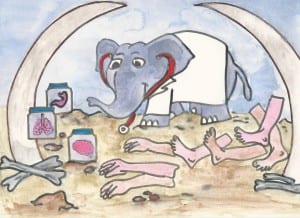
While most species of med school are on the front line working directly with patients, there are many that choose not to.
These creatures spend their lives surrounded by the bodies and limbs of plastic automatons, which they use to mentor up-and-coming students. Lords of their rubbery graveyards, their extensive, timeless memories make them brilliant tutors – they are the Clinical Elephantucators.
A Medicine degree with an Elephantucator
Students first encounter Elephantucators early on in their expeditions, usually in some distant, forgotten corner of the hospital. Within the Elephantucator’s domain, tables adorned with plastic body parts and the dead-eyed stares of an an assortment of dummy heads give the setting a real budget-horror-movie vibe. Surreal as this seems, the Elephantucator is oblivious to the effect, and seeks only to train students in the skills they’ll need to survive.
It’s elephantastic
Clinical Elephantucators take great pleasure in spreading their wealth of knowledge to those eager to learn. Skills, histories or examinations – the species has extensive insight into what is expected of a student, and therefore provides the best guidance in terms of what to revise and what to do in OSCE stations when a student’s time is running short.
The environment’s total absence of patients can prompt the unwise to deem time spent with the Elephantucator to be wasted – a common but horrendous misjudgement. Few hospital environments allow such opportunity to practice clinical skills.
Patients normally object when repeatedly stabbed with cannulas by a clumsy student, but unlike the living, a plastic arm can be used and re-used, without the consequences of failure.
Furthermore plastic arms won’t struggle, call out for help or report you to the GMC if you treat them like pin cushions – a defining point any student should consider when deciding between spending time in an Elephantucator’s graveyard or abducting someone off the street, locking them in a cellar and practicing skills on them (actually, a decent premise for a movie – please don’t steal it).
An Elephantucator never forgets
Some Elephantucators will even let you take treasures from the graveyard. These include gloves (the single greatest bane of a student’s existence), cannulas and countless more, enabling much-needed practice away from the healthcare habitat altogether. Remember, use fruit or something – the GMC aren’t keen on “students abducting people to practice on” becoming a thing.
However, tread cautiously. Elephantucators possess almost perfect memories, meaning individuals of the species will remember a student despite not having see them for countless weeks, months or years.
Though beneficial to those who make positive first impressions, this awareness becomes hazardous to individuals who make negative or clumsy impressions. No matter the times you have cannulated perfectly since, the Elephantucator will still recall when you boasted of your cannulating proficiency to them, only to stab yourself taking it out of the packet. And, given the species desire to spread knowledge, they will enjoy ensuring everyone else knows it too.
Elephantucators possess all the knowledge needed to survive in the Healthcare Habitat, and it only takes a little enthusiasm for them to share it. Time spent with the species is a must for any dedicated student, forming the foundations upon which the jump from student to doctor can be made.
Uploaded by Eric on 22 April 2016
